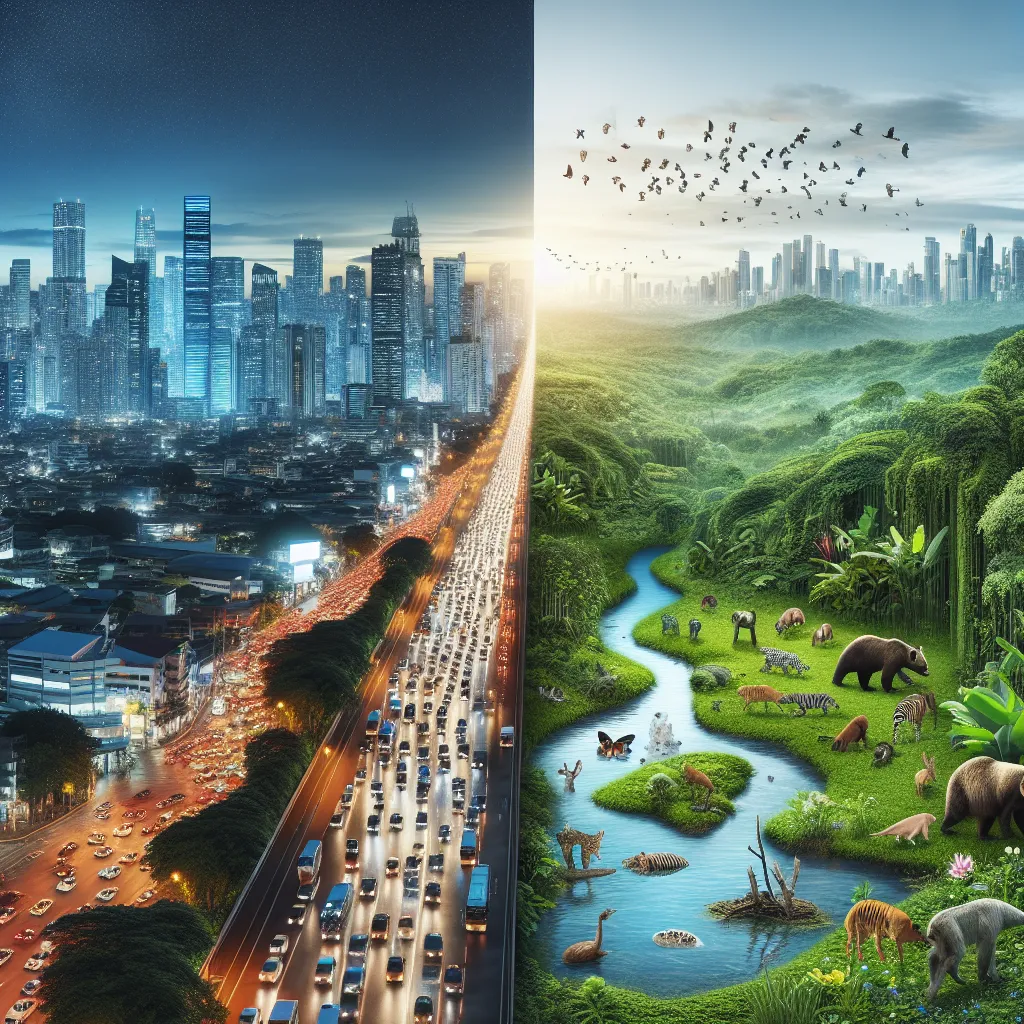Urban development and its effects on natural habitats have become increasingly prevalent topics in IELTS Writing Task 2. This theme reflects growing global concerns about environmental sustainability and biodiversity conservation. Based on recent trends, it’s likely that questions related to urban expansion and habitat preservation will continue to appear frequently in future IELTS exams. Let’s examine a relevant question that has appeared in past tests and provide sample essays to help you prepare.
Nội dung bài viết
Some people believe that urban development should be strictly controlled to protect natural habitats. Others think the needs of humans are more important than protecting the environment. Discuss both views and give your own opinion.
Analyzing the Question
This question presents two contrasting viewpoints:
- Urban development should be strictly controlled to protect natural habitats.
- Human needs are more important than environmental protection.
The task requires you to:
- Discuss both perspectives
- Provide your own opinion
- Support your arguments with relevant examples and explanations
Sample Essay 1 (Band 8-9)
The rapid expansion of urban areas has led to a heated debate about the balance between human development and environmental preservation. While some argue for strict controls on urban growth to safeguard natural habitats, others prioritize human needs over ecological concerns. In my opinion, a balanced approach that considers both human requirements and environmental protection is crucial for sustainable development.
Those who advocate for stringent urban development controls argue that unchecked expansion poses a severe threat to biodiversity and ecosystem health. They contend that the loss of natural habitats can lead to species extinction, disrupt ecological balance, and contribute to climate change. For instance, the destruction of mangrove forests for urban development in coastal areas has resulted in the loss of crucial wildlife habitats and increased vulnerability to natural disasters. By implementing strict zoning laws and green belt policies, cities can limit their ecological footprint and preserve vital natural areas.
On the other hand, proponents of prioritizing human needs argue that urban development is essential for economic growth, job creation, and improving living standards. They assert that restricting urban expansion could hinder progress and limit opportunities for millions of people seeking better lives in cities. For example, rapidly growing cities in developing countries often struggle to provide adequate housing and infrastructure for their burgeoning populations. Limiting urban growth in such contexts could exacerbate social inequalities and impede poverty reduction efforts.
In my view, the solution lies in adopting a balanced and sustainable approach to urban development. Cities can implement smart growth strategies that prioritize compact, mixed-use developments and efficient public transportation systems, reducing the need for extensive urban sprawl. Additionally, incorporating green spaces, urban forests, and wildlife corridors into city planning can help maintain biodiversity within urban areas. The city of Singapore exemplifies this approach, with its extensive network of parks, nature reserves, and green buildings that coexist harmoniously with urban infrastructure.
In conclusion, while the protection of natural habitats is crucial for environmental sustainability, the needs of human populations cannot be ignored. By embracing innovative urban planning techniques and sustainable development practices, we can create cities that meet human needs while minimizing their impact on natural ecosystems. This balanced approach is essential for ensuring a livable and environmentally resilient future for both urban dwellers and wildlife.
(Word count: 374)
 Urban development and natural habitats
Urban development and natural habitats
Sample Essay 2 (Band 6-7)
Urban development and its impact on natural habitats is a topic of much debate. Some people think we should strictly control urban growth to protect the environment, while others believe human needs are more important. This essay will discuss both views and give my opinion.
Those who support strict control of urban development argue that it’s necessary to protect natural habitats. They say that when cities grow, many animals and plants lose their homes. This can cause some species to become extinct. For example, when forests are cut down to build new houses, many animals have nowhere to live. Also, protecting natural areas is important for the environment and can help fight climate change.
On the other hand, people who think human needs are more important argue that we need urban development for progress. They believe that cities provide jobs, better education, and healthcare for people. In many developing countries, people move to cities for a better life. If we limit urban growth too much, it might be harder for these people to find good opportunities. For instance, in India, many people move to cities to find work and improve their living conditions.
In my opinion, we need to find a balance between urban development and protecting nature. I think it’s possible to grow cities in a way that doesn’t harm the environment too much. We can build more efficiently, using less land, and include green spaces in our cities. For example, some cities are creating parks and planting trees to make urban areas more environmentally friendly. We can also use technology to make our cities more sustainable.
In conclusion, while both views have valid points, I believe we should try to develop cities in a way that meets human needs but also protects natural habitats. This balanced approach can help us create better cities for people while also taking care of the environment.
(Word count: 309)
Writing Tips for This Topic
-
Vocabulary: Use a range of environmental and urban development terms. For higher band scores, incorporate more sophisticated vocabulary.
- Band 6-7: urban growth, natural habitats, environment, species, climate change
- Band 8-9: urban expansion, biodiversity, ecosystem health, ecological footprint, sustainable development
-
Grammar: Employ a variety of sentence structures and tenses.
- Band 6-7: Use simple and compound sentences with basic tenses.
- Band 8-9: Incorporate complex sentences, conditional structures, and a wider range of tenses.
-
Coherence and Cohesion: Ensure your essay flows logically.
- Band 6-7: Use basic linking words (however, also, because).
- Band 8-9: Use more sophisticated cohesive devices (moreover, nevertheless, in light of).
-
Examples: Provide relevant examples to support your arguments.
- Band 6-7: Give general examples.
- Band 8-9: Provide specific, detailed examples that demonstrate in-depth knowledge.
-
Balanced Argument: Discuss both sides of the argument before giving your opinion.
-
Conclusion: Summarize your main points and clearly state your position.
Key Vocabulary to Remember
-
Biodiversity (noun) /ˌbaɪəʊdaɪˈvɜːsəti/: The variety of plant and animal life in a particular habitat.
-
Ecosystem (noun) /ˈiːkəʊsɪstəm/: A biological community of interacting organisms and their physical environment.
-
Urbanization (noun) /ˌɜːbənaɪˈzeɪʃn/: The process of making an area more urban.
-
Sustainable (adjective) /səˈsteɪnəbl/: Able to be maintained at a certain rate or level without depleting natural resources.
-
Conservation (noun) /ˌkɒnsəˈveɪʃn/: The protection of plants, animals, and natural areas.
-
Habitat fragmentation (noun) /ˈhæbɪtæt ˌfræɡmənˈteɪʃn/: The process by which habitat loss results in the division of large, continuous habitats into smaller, more isolated remnants.
-
Urban sprawl (noun) /ˈɜːbən sprɔːl/: The uncontrolled expansion of urban areas.
-
Green belt (noun) /ɡriːn belt/: An area of open land around a city where building is restricted.
In conclusion, the topic of managing the impact of urban development on natural habitats is likely to remain relevant in IELTS Writing Task 2. Future questions might explore specific aspects of this issue, such as the role of technology in sustainable urban planning or the economic implications of strict environmental regulations. To prepare effectively, practice writing essays on related themes like urban wildlife conservation, green infrastructure in cities, or balancing economic growth with environmental protection.
We encourage you to try writing your own essay on this topic and share it in the comments section below. This practice will help you refine your writing skills and receive feedback from others preparing for the IELTS exam.


